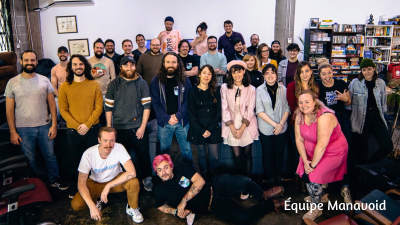Exploring the “secret sauce” in Montreal’s recipe for an innovative gaming industry
Jacqueline RobinsApril 24, 2024
The three Cs in the secret sauce of Montreal’s successful gaming industry are creativity, collaboration and culture, say researchers and industry leaders in the sector.
If the rest of Canada wants a taste of the recipe that’s made Quebec a world-class hub for gaming, using public policy to invest in people is a solid starting point.
Montreal – long renowned as one of the world’s top five gaming capitals – is colloquially referred to as the “Hollywood of video games” across Canada and beyond.
 Dr. Laurent Simon (photo at right), PhD, professor and director, Department of Entrepreneurship and Innovation at HEC Montreal, has co-authored an article in the journal Industry and Innovation studying this phenomenon.
Dr. Laurent Simon (photo at right), PhD, professor and director, Department of Entrepreneurship and Innovation at HEC Montreal, has co-authored an article in the journal Industry and Innovation studying this phenomenon.
Game development company Behaviour Interactive (previously A2M) “were pioneers in Montreal,” he told Research Money. “One of the main reasons – actually, historical reason – is the [Quebec government’s] decision in 1996 and 1997 to develop a funding program, a public funding program for jobs.”
This public funding attracted major players to Quebec’s gaming ecosystem, including Ubisoft, whose presence Simon describes as a turning point in helping the government, under the leadership of then-premier Bernard Landry, expand the program to the local scene.
 Landry’s tax credit led to a majority of Quebec-owned gaming studios in the province and helped fund development of Quebec-owned intellectual property ready to ship internationally, said Chris Chancey (photo at left), founder, president and CEO of ManaVoid Entertainment and board chairman of La Guilde du jeu vidéo du Québec.
Landry’s tax credit led to a majority of Quebec-owned gaming studios in the province and helped fund development of Quebec-owned intellectual property ready to ship internationally, said Chris Chancey (photo at left), founder, president and CEO of ManaVoid Entertainment and board chairman of La Guilde du jeu vidéo du Québec.
Landry’s vision was one “of developing a multimedia ecosystem in Montreal and, with the jobs of the future, using our brains and computers to be able to generate revenue and products and all these different types of things,” Chancey said in an interview. “It was very innovative at the time.”
Provincial policies were foundational in attracting major international studios like Ubisoft, but also helped encourage independent studio development as well, such as the Quebec-owned Behaviour Interactive, Chancey said.
“In Quebec, you have the biggest concentration in the world of international studios. And we have the most game developers per capita than anywhere else in the world. And a lot of that is because of those policies that were implemented.”
The gaming giants grew the ecosystem and generated talent that would spin off into independent studios, Chancey said. These studios, in turn, benefited from lower barriers to entry thanks to digital distribution of games via platforms like Steam.
Simon describes an “intermediary space” that grew between the large firms and creative collectives that formed around them. His research cites the continuous engagement of larger entities with the creative community in Montreal as a regenerative pool for gaming innovation.
“Ubisoft, at some point, realized that they couldn't do what they wanted to do without connecting to art galleries, performing arts, discussion with the National School of Theatre, with Cirque du Soleil,” Simon said.
“Montréalitude” is the word he used to describe this reinvestment in the city’s robust artistic community and culture. It not only inspired game developers and designers, but encouraged further growth throughout Montreal’s diverse artistic communities.
“Techno-creation” is how Simon described Montreal’s history of supporting creative tech communities in IT, computer programming and hacking, which birthed talented game developers to populate the gaming companies that had settled in the city.
Industry has spirit of engagement, cooperation and collaboration
This cross-artistic engagement speaks to a larger spirit of collaboration within Montreal’s gaming ecosystem.
 Chancey (photo at right of his company's team) describes this spirit within Indie Asylum, a non-profit connecting independent game studios and eager investors to encourage mutual growth and creative innovation in gaming.
Chancey (photo at right of his company's team) describes this spirit within Indie Asylum, a non-profit connecting independent game studios and eager investors to encourage mutual growth and creative innovation in gaming.
Indie Asylum involves “extreme collaboration,” sharing of different services and information, and transparency, he said. “We have kind of this ‘all for one and one for all’ mentality,’” he added, where if one person wins everybody wins because all have learned something new.
Collaboration is also foundational to La Guilde du jeu vidéo du Québec, or the Quebec Video Game Guild. This non-profit cooperative, encouraging gaming innovation by connecting local and international gaming communities across development, education and entrepreneurship, is the largest global gaming initiative of its kind.
Chancey emphasized the importance of cooperation across AAA (the “triple A” represents an information classification for major game publishers) and independent studios.
“I think that’s a mindset that we’ve brought in through our cooperative that we created in 2015 called La Guilde, which today represents all of the studios in Quebec. So, it’s 300 studios and 15,000 jobs,” he said.
La Guilde’s board includes members from gaming giants like Ubisoft, Warner Brothers, GameLoft and other big companies with thousands of employees, Chancey said. “And on the other side, there are seven independent studios with less than 50 employees – and everyone understands each other’s struggles.”
Quebec fosters a unique culture of solidarity that builds on its linguistic diversity, with games produced in both French and English. This also means Quebec is well-positioned to interact with international French-speaking gaming sectors.
Despite so many local players, competition is not a problem.
 “For video games, there are so many different genres and different art styles and different themes and different platforms,” Chancey said. (Photo at right shows one of ManaVoid's games).
“For video games, there are so many different genres and different art styles and different themes and different platforms,” Chancey said. (Photo at right shows one of ManaVoid's games).
“And we’re shipping at different times. Ninety-five-percent of the money we’re making is exportation anyway. So, we’re never really competing directly against one another.”
Simon, through his research, has been investigating the notion of “commons.”
“You can’t have commons if you don’t have commoners,” he noted. “So, you need a bunch of people – exactly what’s happening right now in the intersection between new tech and performing arts in Montreal.”
Quebec has, more recently, attracted international attention for the diversity of its academic programs centered on game design and development.
Simon’s research on Montreal as a creative city and the innovative potential of its gaming ecosystem is a direct result of academia’s investment in studying gaming innovation.
Chancey also underscored the importance of academic gaming programs.
“It [academia] plays a huge role,” he said. “I like to think that there were three big generations of game developers.”
He described the first generation as engineers working in their basements, with cathodes and anodes, making consoles and arcades with rudimentary tools to produce video games.
The second generation, he said, are the youth that played those first video games and so had an understanding for the medium, and then started developing products that were pushing the innovation forward.
The new generation, which Chancey said he’s part of, learned to make video games at the university level. “My reference point is a lot different than someone that came from movies or TV or just had a general programming background. I’ve learned how to make video games professionally at school.”
Understanding innovation at the “molecular” level
Chancey lauded the value in approaching game design and development from both practical and theoretical perspectives. He described the balance of learning from ex-game developers-turned-professors as well as PhD holders.
This balance, he said, leads to well-rounded graduates who are primed to lend their ideas and expertise to the gaming companies found right next door.
Simon said Quebec’s unique culture also plays an important role in perpetuating gaming innovation.
Some research indicates Montreal has the second-highest density of artists among North American cities, he noted. This leads to a diversity of genres, including performing arts, video game production, movies, and publishing. He added: “And we can connect that to the uniqueness of the Quebecer culture.”
“We’re one of the rare territories where people are consuming a lot of their own local culture, along with some culture from the U.S. and other countries,” Simon said. “But Quebecers are [largely] consuming Quebecer culture. So it makes a huge difference because it feeds the milieu.”
Simon referred to a study co-authored by Dr. Richard Florida, PhD, University Professor and professor of economic analysis and policy at the Rotman School of Management, and distinguished scholar-in-residence, School of Cities, University of Toronto, to further describe the cultural connective tissue in Montreal.
The research team was surprised by “this very specific connectivity of Montreal. And this connectivity is difficult to assess because it’s really a question of sociology,” Simon said.
He credited the horizontal structure of businesses in Montreal as making it easier for people to get involved in creative industry, and in turn, in creative collaboration.
When tying his research to Canada’s innovation ecosystem as a whole, Simon stressed the value in understanding innovation at the molecular level.
“We need to understand further that innovation is not only ‘discovery-invention-innovation,’ that the innovation value chain means also processing multiple bases of knowledge,” he said. “So it’s a social endeavour. And that it takes specific practices.”
Innovation also involves intermediary spaces, openness, debates about value that we don’t have enough, and recognizing it’s not only about economic value, Simon said.
“One thing that’s key is that we still need to work out what it means to organize innovation. At the scale of a city, at the scale of a province, at the scale of a country, we shouldn’t take for granted that research will automatically translate into ‘discovery-invention-innovation.’”
Simon, who does a lot of executive education and training, said there’s a need for communicating a basic understanding of the innovation value chain.
“I always have to start from the ground up, saying, ‘Okay, what's innovation? Why is it important? How does it work?’ We still need to work on it. Because even if we think we understand, most organizations are not there yet.”
Chancey pointed out that a back-to-basics approach would benefit Quebec’s gaming industry in the context of business practices, such as how to properly administer companies and effectively market products.
“These are things that we’ve never developed in Quebec, because we published our games in the U.K. and France and the United States and elsewhere. So I think we have some catching up to do in the business side of things in Quebec.”
Influence of Quebec’s francization and bilingualism on gaming industry
Quebec’s increasing francization is also a double-edged sword for its gaming industry when it comes to building local innovation while maintaining international ties, Chancey said.
“The current government stance is strong enough where people are telling themselves, ‘Well, learning a new language. I’m 45 years old, I'm a senior developer in Texas. Is that really something I want to do at this point?’ So the challenge [of] attracting senior talent is always the problem.”
Chancey was referring to the recent implementation of Bill 96 in Quebec, which gives immigrants six months to learn French before receiving exclusively French government communications, and prioritizes French-speaking in public spaces and workplaces.
He noted 7.5 percent of the provincial government’s gaming tax credits are reserved for game companies producing French versions of their games.
Chancey highlighted Quebec’s bilingualism as positive in a financial sense, but also in seeing the greater value that a diversity of language, and population, brings. Such diversity drives creative collaboration and sharing of ideas that produces the right conditions for disruptive artists, and enables the flourishing of the cities and innovation ecosystems which they inhabit.
“Everyone that comes to Quebec into Montreal falls in love with the city and the province,” Chancey said. “So I think we need to trust . . . that our culture will be protected no matter the few hundred people we bring into the ecosystem every year, or a few thousand people that come into the ecosystem every year.”
The key takeaways from Montreal’s gaming success are:
- Government needs to have a vision for innovation and build public funding initiatives around that vision.
- Anchor companies, like Ubisoft, are important, but don’t underestimate the value of informal actors in shaping the regenerative potential of the innovation ecosystem.
- Major companies need to engage with the communities around them to increase creative potential and generate ideas, talent and collaboration.
- There is value in each region’s unique cultural landscape, and in using cultural strengths as a blueprint for growing the targeted innovation sector.
- Innovation is not parthenogenetic – it needs people and culture to help it grow. This means people being offered targeted, well-rounded education opportunities, democratized and equitable public funding, and constant collaboration across creative communities to prioritize ideation and talent development.
R$
Events For Leaders in
Science, Tech, Innovation, and Policy
Discuss and learn from those in the know at our virtual and in-person events.
See Upcoming Events
You have 1 free article remaining.
Don't miss out - start your free trial today.
Start your FREE trial Already a member? Log in
By using this website, you agree to our use of cookies. We use cookies to provide you with a great experience and to help our website run effectively in accordance with our Privacy Policy and Terms of Service.



.png)
